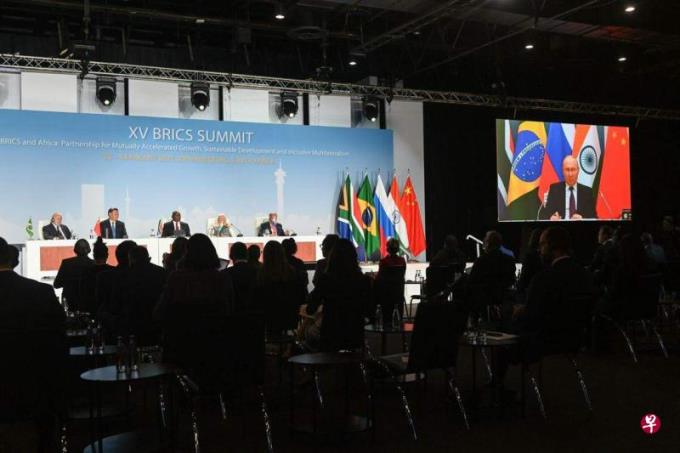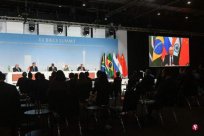
The 15th BRICS leader meeting in South Africa decided on August 24 to invite Iran, Egypt, Saudi Arabia, Arabian United Emirates, Ethiopia, and Argentina to jointly defend the interests of the "global southern countries".The so -called BRICS countries are not geopolitical concepts, but the investment concept proposed by Wall Street in 2001. Now I have no intention of inserting willows and developing into an international organization that develops into a "non -Western"., One of the responses made.Due to the lack of common values and accurate collective interests, whether the expansion of the BRICS countries can still play a greater international influence, it still needs to be observed.
BRICS countries are not political or economic and trade organizations in a strict sense, but are the investment concepts proposed by Goldman Sachs in 2001 because Brazil, Russia, India, China, and subsequent South Africa are all populated countries in emerging markets.Since the first summit in 2009, the BRICS countries have cooperated, but the issue of some issues in some issues has always existed.Taking the Russian and Ukraine War as an example, although they are deliberately staying with the United States and Western assistance to Ukraine to resist Russia's invasion, it is basically the same as the Lord, but there is no consistent action plan; India also publicly criticizes Russia's practices that are not in line with the spirit of the times.
Lack of common geographical interests is the biggest weakness of the BRICS countries, but they can continue to interact, and attract more population, resources and geographical powers this year, showing that the US -China game and even the opposition between China and the West are the worldwide situation.The impact allows more countries to hold a group heating in the multi -pole world that is against globalization.After the outbreak of the United States and the West after the outbreak of the Russian and Ukraine War, Russia's comprehensive sanctions made more countries aware of the threat of the US dollar hegemony.Another example is that the United States resorted to scientific and technological plugging and the act of weapons of international financial mechanisms, the deterrent and potential lethality of the sovereign state is real.The internationalization of the RMB led by China is a specific response with more countries.
In addition to the "non -West", the same point, although the BRICS countries have superficial interests such as climate change, infrastructure demand, food security, etc., lack of common values and geopolitical interests.It means that they are difficult to condense the collective power, and the "Western" international organizations represented by the Seventh Kingdoms Group, such as the Seventh Kingdom Group, resist the ceremony.The United States as a leader in the Western world is very clear, and in comparison, the BRICS countries seem to have no heads of dragons.With the strength of the world's second largest economy, China can indeed play some leading role. However, not only is Russia unwilling, India, which has caught up with economic development, will not look at the Beijing horse.
The BRICS Five Kingdoms accepted six new members in one breath. In the short term, it has the role of growing up, but it may bring more coordination problems in the middle and long term.In addition to the original BRICS five countries and the lack of common problems, the border conflict between China and India has made internal contradiction management quite tricky.Now joining Saudi Arabia and Iran's opponents of the Islamic world may make the decision -making process more complicated.Although the two countries have recently demonstrated the reconciliation momentum, the "gold content" has not been tested.The BRICS country must be a force in the polar world.
The fundamental interests of "Global Southern countries" are to require fair treatment in developed countries in the West, and even increase assistance to themselves, including open markets and technology."Southern countries" are not much different from each other.Just like Singapore launched the "Small State Forum" in the United Nations in 1992, collectives may improve the bargaining ability that they do not have, but the premise is still the degree of unity of various countries, and it cannot be a scattered sand.This is accurate for any international organizations.
BRICS expansion, I believe this will not be the last round.The expansion of the US -China game has accelerated the reorganization of the global industrial chain. The United States and the allies' military preparations in the Indo -Pacific region have even made the international community worry about the possibility of the outbreak of the international community."Non -Western" countries form areas or international organizations, or strengthen existing organizations to protect themselves, which are generally adopted.In addition, at the moment of this round of global industrial chain adjustments, how to seek a place in the new industry chain is another key consideration.
The polarization of the world is the general trend, and it is not necessarily a bad thing, provided that it should not evolve into a group confrontation.In addition, it must be realized that multi -poleization does not represent the fading of US influence. Its capital, market and technology are still yearning for other countries, including most members of the BRICS countries.


